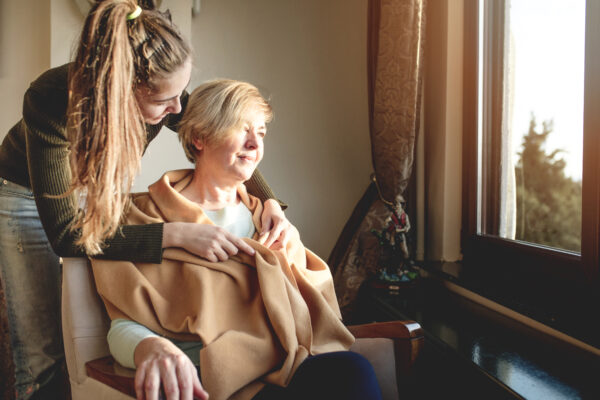Understanding the Common Signs of Depression in Older Adults

How you can help your loved one who might be feeling down
Throughout the United States, an estimated seven million adults ages 65 and older suffer from depression. At the same time, many older adults never receive a formal diagnosis for their depression. For some, the perceived stigma of seeking help stands in the way of mental and emotional wellness. For others, the complex symptoms of depression are misdiagnosed as something else. In either case, our Knute Nelson team is here to spread awareness.
That’s why we’ve outlined the why behind depression in older adults while shining light on some of the most common symptoms. Whether for yourself or someone you love, the first step to receiving care is understanding.
Why are older adults more susceptible to depression?
Contrary to popular belief, depression is not a normal part of the aging process. Despite this, older adults are at a higher risk of depression.
Although depression can be linked to social isolation or substance abuse, loss is one of the most common causes in older adults. Whether that's the loss of physical health or the loss of a loved one, those negative emotions can take a toll. Unfortunately, these losses and life changes can compound over time, leaving many older adults with a heavy emotional burden.
What are the symptoms of depression in older adults?
Although sadness and depression may seem the same, feeling blue is only one of the many symptoms of depression.
For example, some older adults experiencing depression may have a loss of interest in activities that once brought them joy. Others may demonstrate abnormal sleep patterns accompanied by less energy. Irritability, anxiety, and difficulty concentrating are other common symptoms.
Even today, many older adults view depression as a sign of weakness. In turn, they often blame their symptoms on other circumstances or health conditions. That’s why our Program to Encourage Active, Rewarding Lives (PEARLS) at Knute Nelson offers completely confidential mental health care to overcome this common barrier.
How can treating depression improve quality of life?
As part of our Population Health Program at Knute Nelson, we believe in serving the whole person. This means enriching each patient’s physical, emotional, social, and spiritual wellness, among others. For those experiencing depression, however, the negative effects transcend mental wellness alone.
From self-isolation to reduced physical activity, depression affects the whole person. Through treatment for depression, older adults can improve their mood, increase physical activity, connect with others, strengthen their faith, and more.
Where can older adults find help for depression?
The PEARLS program offered through Knute Nelson supports patients through six months of sessions. These sessions prioritize social connectedness, problem-solving, physical activity, and beyond.
PEARLS is made possible at no cost through generous grants supporting our Population Health Program. In turn, we strive to turn health obstacles into opportunities for elevated quality of life. Take charge of your mental health today. We invite you to visit our website or give our Age Well Coordinator a call at (320) 852-2217.
Meet the Author
As the Vice President of Population Health at Knute Nelson, Lindsey Sand is a dynamic force in the realm of senior care. With a strong commitment to her profession, Lindsey has dedicated her career to serving aging adults. Her deep connection to her grandparents and elder neighbors growing up, as well as frustrations with the healthcare system, guided her path toward industry disruption. Sand holds licenses as a nursing home administrator and health services executive. She also has a B.A. in Psychology and Human Services and a graduate certificate in Long-Term Care Administration.
She plays a vital role in various organizations including Lakes Area Age Friendly and LeadingAge Minnesota, including the Chair for the LeadingAge Minnesota Foundation. Beyond her professional life, Lindsey shares her life with her husband, Brian, and their two spirited daughters, Lucy and Lily. The family’s hobbies include basketball, cheerleading, gymnastics, church life, and family time. Sand’s journey is an inspiring testament to the commitment to the well-being of older adults.

Published March 1st, 2024

